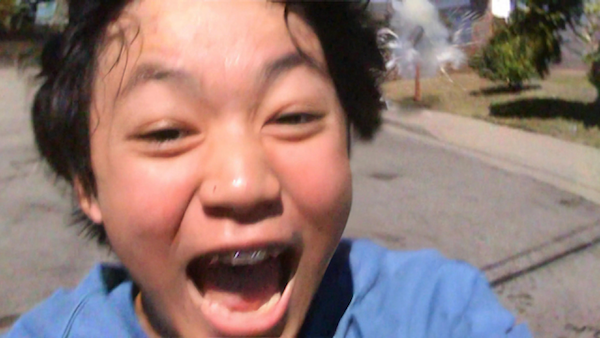Movie review by Greg Carlson
In January, Sean Wang’s thoroughly satisfying feature directorial debut “Didi” premiered to plenty of buzz and acclaim at Sundance, where it collected the U.S. Dramatic category’s audience award and a special jury recognition for its ensemble. On a serious roll, Wang has been a busy filmmaker in recent months. His short documentary “Nǎi Nai & Wài Pó” received an Oscar nomination and screened in the 2024 Fargo Film Festival, which awarded Wang best director honors. Like Bo Burnham’s “Eighth Grade,” “Didi” is a sensational coming of age story that finds the ideal balance between the painful awkwardness of adolescence and the warm-hearted hopefulness that everything will turn out alright.
On the cusp of leaving middle school behind, Chris (Izaac Wang) manages the typical struggles of a 13-year-old in 2008. He scraps daily with older sis Vivian (Shirley Chen), who is preparing to fly the nest they share with mom Chungsing (Joan Chen) and Nai Nai (Chang Li Hua) for UC San Diego. He hangs out with pals Fahad (Raul Dial) and Soup (Aaron Chang), with whom he makes short videos to post on YouTube. Chris crushes hard on dream girl Madi (Mahaela Park), who – against the seeming odds – returns his interest. But the bonds of friendship and the promise of romance can turn on a dime, as Chris will soon find out.
Chris is the only male in the household (his father supports the family from his job in Taiwan), and Wang juxtaposes the gynocratic hierarchy of three generations of women against the often horrifying expressions of ignorant and ugly misogyny casually applied by Chris’s peers to other classmates. The number of times that Chris uses an insult (he doesn’t fully comprehend the impact of repeating “dumb bitch”) that makes us wince has the effect of building up pressure that will lead to an inevitable confrontation with the patient and forgiving Chungsing. Chen is Wang’s not so secret weapon here, filling her character with oceans of grace.
Wang pays close attention to the period details of the social media and electronic communication of the time. The sights and sounds of Myspace, Facebook, Google, and AOL Instant Messenger as they appeared at the end of the first decade of the 21st century will certainly spark madeleine de Proust explosions of nostalgia for viewers who share a birth year (or thereabouts) with the director’s semi-autobiographical protagonist. “Didi” appreciates the rapidly accelerating impact of internet communication and digital technology. Many of the movie’s key moments occur via the text boxes of online chat, which Wang deploys with a deft touch.
In another universe, one could imagine the events of “Didi” unfolding as a screenlife exercise, but Wang’s affinity for his performers yields moments that are at times tender, hilarious, awkward, embarrassing, and charged with all the frustrations and growing pains one associates with being a kid. Chris will join up with a group of older skateboarders after claiming videography skills and experience he doesn’t yet possess. In one great scene, the skaters admonish Chris for the shabby way he treats Chungsing, offering a reality check neither Chris, nor the viewer, expects. Wang never strays too far from the ups and downs of the parent/child dynamics that define the liminal space Chris inhabits as a young person growing into someone whose innocence evaporates before our eyes.
